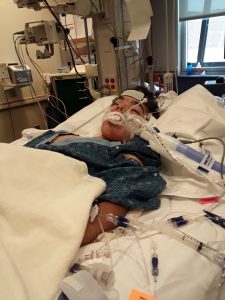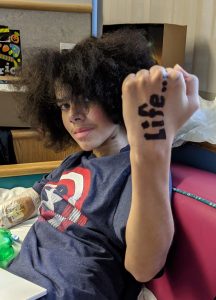Eli’s Long Journey to a Double-lung Transplant
Written by |

The lives of pulmonary hypertension (PH) patients, transplant recipients, and their caregivers interconnect through our experiences and profound compassion for what we’re all going through. Sharing our journeys is like passing a torch from one person to another, helping to light the way through this dark disease.
In an email interview, Jacqueline Crawford shared her son Eli Rufus’ inspirational story about struggle, defeating the odds, and embracing a second chance at life.
Jacqueline and her husband have seven children. Eli, 15, is fifth in line, and was diagnosed with PH in 2019 at Children’s National Hospital in Washington, D.C.
Prior to the PH diagnosis, Eli struggled with what doctors believed were nocturnal seizures. During a routine echocardiogram, Jacqueline could tell something was terribly wrong. Eli’s heart was beating out of control, and the technician was asking pointed and somber questions.
“I remember sitting in that darkened room praying over and over, ‘Please let it be fixable or livable,'” Jacqueline wrote.
Minutes after the exam, they were introduced to a PH specialist and a nurse practitioner. Jacqueline poignantly described what that was like.
“I can still picture them standing across the room explaining lung pressures, right heart failure, medications that are not a cure for PH but can treat symptoms, including a continuous intravenous treatment. The scariest thing, they had a bed ready for Eli in the intensive care unit where he would stay inpatient for a minimum of two weeks. The information crashing into me on that first day, in those first 30 minutes, was so dense, I could barely absorb a quarter of it.”
Watching what Eli would go through over the next few days was the most difficult lesson in just how sick her son was.
Jacqueline explained, “Monitors alarmed all night, he needed supplemental oxygen around the clock, his scans were all abnormal, his liver and heart were swollen, his lungs were struggling for air, and his bloodwork results were terrifying.”
Each day brought more bad news, and all Jacqueline wanted to do was take her baby home.
“I felt certain we only had weeks or months left with Eli, and I wanted every moment to count,” she added.
Unfortunately, her motherly instincts were right about how sick and unstable Eli was. Two months after diagnosis, Eli suffered a PH crisis, which led to cardiac arrest, and he was placed on extracorporeal membrane oxygenation (ECMO). ECMO involves pumping a person’s blood to an external heart-lung machine, which allows the blood to bypass these organs so they can rest and heal.
Eli’s lung biopsy results led to a diagnosis of pulmonary veno-occlusive disease (PVOD), a rare form of PH.
“It was the worst-case scenario. PVOD has no cure, no meds on the market to treat it, and a life expectancy of two years after diagnosis, and Eli had been misdiagnosed for at least a year,” she said.
Eli couldn’t survive off of ECMO, so his doctor recommended a Potts shunt procedure to improve his pulmonary blood flow and cyanosis. It saved Eli’s life, and he was taken off ECMO.
Unfortunately, Eli still had two terminal diseases, and Jacqueline was concerned about a future transplant. She heard that recovery is difficult, rejection is a constant threat, and average life expectancy is five years. She believed that Eli would hate being hours away from home during the post-transplant hospital stay.
In lieu of transplant, Jacqueline and her husband thought they would likely take Eli home after his Potts shunt surgery and make as many happy memories as possible with the time he had left.
“Thank God, Eli knew his own path. He wanted that lung transplant. He wasn’t ready to leave his family. He wanted to live,” Jacqueline wrote.
Last October, Eli received a double-lung transplant at the Children’s Hospital of Philadelphia. Jacqueline thanks God every day for Eli’s donor.
“I know our donor’s positive energy continues to breathe life into Eli. These lungs have already lived one precious life; what a miracle that they’re now living a second. I pray every morning for our donor family who cared so much about other people that on the worst day of their life, they helped make a miracle happen in ours. They saved a life, and that impact is far-reaching. Being an organ donor doesn’t just save a life, it saves a family and a future.”
Jacqueline offered advice to other parents: “Depending on age, include your child in the transplant decision. Don’t wait too long. Eli recovered surprisingly well from transplant, and his medical team credits timing for that. He was sick enough to need new lungs, but not too sick to recover. Do your own research. Focus on the positives. Join lung transplant support groups. You’ll hear the good, bad, sad, and miraculous. Ask a million questions, then ask a million more.”
***
Note: Pulmonary Hypertension News is strictly a news and information website about the disease. It does not provide medical advice, diagnosis, or treatment. This content is not intended to be a substitute for professional medical advice, diagnosis, or treatment. Always seek the advice of your physician or other qualified health provider with any questions you may have regarding a medical condition. Never disregard professional medical advice or delay in seeking it because of something you have read on this website. The opinions expressed in this column are not those of Pulmonary Hypertension News or its parent company, Bionews, and are intended to spark discussion about issues pertaining to pulmonary hypertension.







Leave a comment
Fill in the required fields to post. Your email address will not be published.